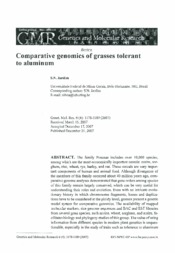Comparative genomics of grasses tolerant to aluminum.
Comparative genomics of grasses tolerant to aluminum.
Autoria: JARDIM, S. N.
Resumo: The family Poaceae includes over 10,000 species, among which are the most economically important cereals: maize, sorghum, rice, wheat, rye, barley, and oat. These cereals are very important components of human and animal food. Although divergence of the members of this family occurred about 40 million years ago, comparative genome analyses demonstrated that gene orders among species of this family remain largely conserved, which can be very useful for understanding their roles and evolution. Even with an intricate evolutionary history in which chromosome fragments, losses and duplications have to be considered at the ploidy level, grasses present a genetic model system for comparative genomics. The availability of mapped molecular markers, rice genome sequences and BAC and EST libraries from several grass species, such as rice, wheat, sorghum, and maize, facilitates biology and phylogeny studies of this group. The value of using information from different species in modern plant genetics is unquestionable, especially in the study of traits such as tolerance to aluminum in soils, which affects plant growth and development. Comparative genomic approaches to aluminum tolerance can identify genomic regions and genes responsible for aluminum tolerance in grasses.
Ano de publicação: 2007
Tipo de publicação: Artigo de periódico
Unidade: Embrapa Milho e Sorgo
Palavras-chave: Genética Vegetal, Tolerância ao alumínio
Observações
1 - Por padrão são exibidas publicações dos últimos 20 anos. Para encontrar publicações mais antigas, configure o filtro ano de publicação, colocando o ano a partir do qual você deseja encontrar publicações. O filtro está na coluna da esquerda na busca acima.
2 - Para ler algumas publicações da Embrapa (apenas as que estão em formato ePub), é necessário ter, no celular ou computador, um desses softwares gratuitos. Sistemas Android: Google Play Livros; IOS: iBooks; Windows e Linux: software Calibre.
Acesse outras publicações
Acesse a Base de Dados da Pesquisa Agropecuária (BDPA) para consultar o acervo completo das bibliotecas da Embrapa.

